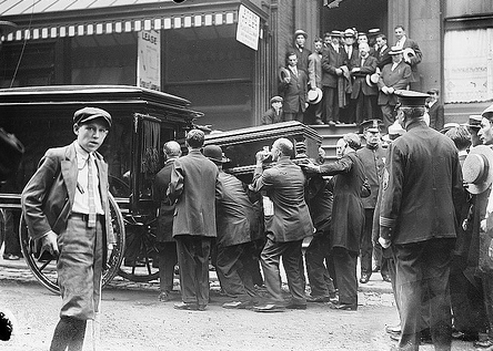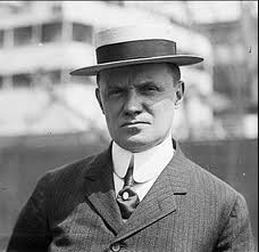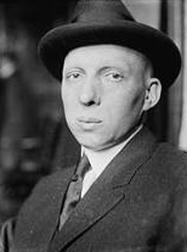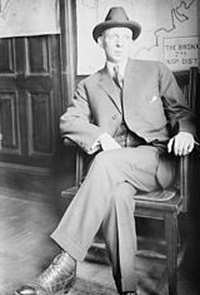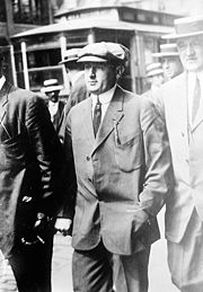It all comes apart for Becker
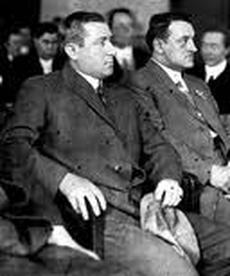
Whitey Lewis in court.
Rose was a gambler and owned a small-time Connecticut gambling house as well as the Rosebuds, an early minor league baseball team in Connecticut. He eventually moved to New York City and opened a gambling house on Second Avenue called the Rosebud. It became a popular hangout for the underworld, particularly by members of the Eastman Gang. Rose soon became friends with Monk Eastman, Zelig and members of the Lenox Avenue Gang. He was a popular and well-liked club owner and there was even a cocktail, The Broadway Rose, named in his honor.
In the summer of 1912, Becker and his NYPD Gambling Squad raided Rose's place. In exchange for not closing him down, Rose agreed to pay Becker 25 percent of his weekly earnings, which amounted to about $10,000 a month. Additionally, Rose agreed to act as Becker's official collector and pick up weekly payoffs from all the other places from which Becker extorted money. Rose's role in Becker's organization was detailed in Rosenthal's affidavit that was part of the newspaper story that exposed Becker's operations.
When Rosenthal was murdered, the car used for the getaway was traced to a Lower East Side automobile rental office where the owner identified Rose as the man who rented it the day of the murder. Whith this information, Whitman had police begin rounding up suspects, including the Lenox Avenue Gang.
Three days after the murder, Rose turned himself in and confessed to his part in the murder. He said he hired the gunman, Gyp the Blood, "Lefty Louis" Rosenberg, "Whitey Lewis" Seidenschner and "Dago Frank" Cirofisi, and also hired the getaway car. He said he paid the men $1,500 on Becker's orders.
For consideration with his sentencing, he agreed to testifiy against Becker and the others. All were eventually convicted, and Becker was executed in 1915 for his role in the crime.
Rose was given his freedom for testifying and he was offered $1,000 a week to go on the vaudeville circuit to lecture on crime. He and his wife, Hilda, left New York City and he eventually began lecturing in churches about the evils of crime. All but forgotten by the underworld and the public, he returned to New York City years later and died in a hospital in 1947 of natural causes. Despite the belief the underworld would kill him for testifying, there appears to have been no attempts on his life.
Home Previous
In the summer of 1912, Becker and his NYPD Gambling Squad raided Rose's place. In exchange for not closing him down, Rose agreed to pay Becker 25 percent of his weekly earnings, which amounted to about $10,000 a month. Additionally, Rose agreed to act as Becker's official collector and pick up weekly payoffs from all the other places from which Becker extorted money. Rose's role in Becker's organization was detailed in Rosenthal's affidavit that was part of the newspaper story that exposed Becker's operations.
When Rosenthal was murdered, the car used for the getaway was traced to a Lower East Side automobile rental office where the owner identified Rose as the man who rented it the day of the murder. Whith this information, Whitman had police begin rounding up suspects, including the Lenox Avenue Gang.
Three days after the murder, Rose turned himself in and confessed to his part in the murder. He said he hired the gunman, Gyp the Blood, "Lefty Louis" Rosenberg, "Whitey Lewis" Seidenschner and "Dago Frank" Cirofisi, and also hired the getaway car. He said he paid the men $1,500 on Becker's orders.
For consideration with his sentencing, he agreed to testifiy against Becker and the others. All were eventually convicted, and Becker was executed in 1915 for his role in the crime.
Rose was given his freedom for testifying and he was offered $1,000 a week to go on the vaudeville circuit to lecture on crime. He and his wife, Hilda, left New York City and he eventually began lecturing in churches about the evils of crime. All but forgotten by the underworld and the public, he returned to New York City years later and died in a hospital in 1947 of natural causes. Despite the belief the underworld would kill him for testifying, there appears to have been no attempts on his life.
Home Previous
